THE GAME WAS only a few minutes old, but it already had the look of one that Stefan Effenberg wasn’t going to enjoy.
A pass that was bound for a team-mate was sent askew by a divot in the playing surface, emitting sarcastic applause from the home supporters.
“Stick to the tennis, Edberg!” recommended one of them.
Seven days after he played for the world champions in a win against England at Wembley, Effenberg was on a rugby pitch in the southside Cork suburb of Ballyphehane, being mocked by the fans of a club whose annual turnover was smaller than his salary.
“Some of the potholes in the pitch would not look out of place on a Cavan side road,” Charlie Stuart remarked in his match preview for the Irish Press on the morning of Cork City’s meeting with Bayern Munich at Musgrave Park.
“This is a real David and Goliath affair. Anything other than a comprehensive victory by the famous German club would be regarded as one of the biggest upsets in European football this week.”
* * *
BACK IN 1971, Cork welcomed the formidable Borussia Mönchengladbach team that won the Bundesliga title five times in the space of eight seasons.
One of the goals in Gladbach’s 7-1 aggregate win against Cork Hibernians in that European Cup tie came via striker Jupp Heynckes, who went on to win both the European Championship and World Cup as a player with West Germany.
- For more great storytelling and analysis from our award-winning journalists, join the club at The42 Membership today. Click here to find out more >
When the draw was made for the first round of the 1991-92 Uefa Cup, Heynckes – in his capacity as head coach of Bayern Munich – again found himself in opposition to a man he faced at Flower Lodge (now Páirc Ui Rinn) a couple of decades prior.
The late Noel O’Mahony, one of the Cork Hibs defenders who attempted to shackle Heynckes and the great Gunter Netzer, was managing the Cork City side that was paired with the glamour club of German football.
In the days before European competitions were reconfigured to expand the gap between the rich and poor, contests such as this one allowed bantamweight pretenders to share the ring with heavyweight champions.
Unlikely to be remembered by many Bayern supporters, it remains one of the defining occasions in the history of Cork City FC since the formation of the club in 1984.
After qualifying as League of Ireland Premier Division runners-up, City’s only hope for the Uefa Cup draw was to avoid a repeat of the club’s only previous involvement in Europe.
Ryanair weren’t operating low-fare routes beyond the Iron Curtain back in 1989 for the Cup Winners’ Cup meeting with Torpedo Moscow – a tie that ended in a 6-0 loss on aggregate.
With O’Mahony’s side five goals in arrears after the first leg, the prospect of recouping the travel expenses through TV rights and a bumper attendance for the return game had vanished by the time the Russian club came to Turner’s Cross.
“I’m hugely honoured that we’ve been given such a good draw,” the Cork City manager said after learning of the impending clash with Bayern Munich.
“I realise we’ll have no chance of winning but we’ll give them a run for it and hopefully Bayern will bring out a big crowd in Cork. The last thing we needed was a financially crippling tie.”
Twelve months before facing Cork City, Bayern appeared to be in rude health. They entered the 1990-91 season as West German champions, having successfully defended their Bundesliga title again.
An impressive squad, which boasted six members of the national team that had just returned from Italy as World Cup winners, was bolstered further by the signings of a trio of much-vaunted youngsters: Stefan Effenberg, Brian Laudrup and Christian Ziege.
A sixth league triumph in seven years seemed a formality until they faltered in the closing stages of a title race with Kaiserslautern. After a surprise defeat to minnows Wattenscheid, Bayern could only draw at home to already-relegated Uerdingen on the final day of the campaign.
In the European Cup, a competition Bayern were aiming to win for the fourth time in their history, they came unstuck at the hands of the eventual champions in the semi-finals for the second consecutive season.
An own goal from Klaus Augenthaler in the 90th minute of the second leg sent Red Star Belgrade through to the decider at the expense of Jupp Heynckes’ side, who lost to AC Milan via away goals at the previous season’s penultimate stage.
There was also the ignominy of failing to make it beyond the opening round of the DFB-Pokal (German Cup) for the first time ever. Their elimination, inflicted by fourth-tier amateur outfit FV Weinheim, helped to ensure that Bayern finished 1990-91 without major silverware; a portent of things to come.
There followed a summer of significant departures. Juventus ransacked Heynckes’ defence by luring Jurgen Kohler and Stefan Reuter to Serie A. That was compounded by the retirement of Augenthaler, their vastly experienced captain.
Although Bayern lost three players from West Germany’s victorious Italia 90 squad in quick succession, they did manage to snare one member of the World Cup-winning side.
However, following his move from Roma, Thomas Berthold would fail to live up to expectations while playing just 35 games in his two years in Munich. The versatile defender was subsequently labelled “the best-paid amateur golfer in Germany” by club treasurer Kurt Scherer.
Other notable arrivals ahead of the 1991-92 season were Karlsruher defender Oliver Kreuzer, Brazilian internationals Bernardo and Mazinho, and striker Bruno Labbadia, who was poached from champions Kaiserslautern.
While Bayern dealt in millions, the £7,000 paid to Galway United for FAI Cup final hero Johnny Glynn was the height of Cork City’s extravagance in the transfer market.
“Cork City are paupers to Bayern’s aristocrats,” wrote Declan Colley in Cork’s Evening Echo. “A karaoke singer up against Bruce Springsteen.”
Talented winger Gerry McCabe, who played top-flight football in his native Scotland with Hamilton Academical and Clydebank, was City’s other major addition as they put plans in place to atone for their squandering of the league title.
A win at home to Dundalk on the final day of the 1990-91 season would have crowned the Leesiders champions, but they were thwarted by a Tom McNulty goal that sent the trophy to Oriel Park instead.
Three months later, Noel O’Mahony’s players were still coming to terms with the loss when they were instructed to assemble at Cork Airport for a pre-season trip.
Some of them were convinced they were being subjected to a prank until they saw the route mapped out on the boarding passes that were pressed into their hands: Dublin, Frankfurt, Peking, Shanghai.
The story goes that the organisers of the Marlboro Cup hoped to attract one of the big English sides to compete in the July 1991 tournament. After club chairman Pat O’Donovan put his business connections to good use, they got Cork City instead.
In front of crowds of over 30,000 at the Hongkou Stadium, City acquitted themselves ably despite losing to Poland’s national team and the Chinese Olympic side. The tournament, which was won by Romania’s national team, also featured a Shanghai selection and Dutch club ADO Den Haag.
During their stay in China, the City players were enjoying some poolside refreshments at their hotel when O’Donovan delivered the big news from home.
“Your immediate reaction when you’re told that you’re going to be playing in the Uefa Cup against Bayern Munich is to think that you’re having the piss taken out of you,” recalls centre-back Declan Daly, one of the players who provided a strong local core to the Cork City team.
“The beauty of the European competitions at the time was that you could play the best teams. Imagine how many rounds you’d have to get through nowadays to get anywhere near a team like Bayern Munich. It was an unreal feeling.
“Losing the league to Dundalk the way we did, it was the lowest point you could have been at. In Turner’s Cross then, both dressing rooms were connected to the same set of showers. On one side you had the absolute elation of one team, and on the other side there was the total devastation of another.
“Sport is full of ups and downs, so to be drawn against Bayern really helped pick us back up.”
Upon returning from China, Cork City faced into a series of pre-season friendlies against cross-channel opposition. Leeds United, Manchester City, Sunderland and Liam Brady’s Celtic – who they beat 2-0 – helped Noel O’Mahony’s team acclimatise to the realities of breathing the same air as top-class opposition.
“We would have been training on Tuesday and Thursday, with a match on Sunday,” explains Daly, who was employed at the time by Eagle Star Insurance. “We were real part-timers so playing against big clubs who came over here was always a huge eye-opener.
“The pre-season friendlies were great, even though they probably weren’t at full intensity because the lads we were playing against might already have trained that day. There was a serious intensity to the games in China – they were very competitive games – but it all stood to us in terms of getting ready for Bayern.”
The imminent arrival of one of the biggest teams in the world presented Pat O’Donovan with an opportunity to enhance his club’s financial situation. It also left the Cork City chief with a dilemma, as it quickly became clear that Turner’s Cross wasn’t fit to host a game of such stature.
Lansdowne Road was considered, yet O’Donovan was determined to keep the fixture on Leeside. Musgrave Park, the Cork headquarters of Munster Rugby, was available, but some modifications were required by Uefa.
The ground had been used for the pre-season friendlies, which saw young fans scrambling for autographs from the likes of Gordon Strachan, Niall Quinn and Packie Bonner.
To ease the concerns of European football’s governing body, O’Donovan had a two-metre-high fence erected around the perimeter of the pitch at a cost of £5,000.
A call from Cork politician Michael Creed for the GAA to circumvent their rulebook by making Páirc Uí Chaoimh available fell on deaf ears, although the Fine Gael TD’s suggestion did receive the vehement backing of Cork Examiner columnist Sean Dunne.
“The Cork County Board, following the constitution of the GAA, will not allow soccer matches to be played there,” he wrote. “They will allow Prince to parade up and down on a stage there, singing of sex and simulating masturbation, but they will not allow a soccer match. It is unbelievable. It is appalling. It is grotesque.”
While the staging of the game in Cork was welcomed by City supporters, the announcement of ticket prices wasn’t as warmly received.
After 6,000 spectators had paid in to see the win against Celtic, an attendance of twice that number was being estimated for the first leg against Bayern Munich on 18 September.
However, the pricing strategy soon became a source of public anger. From £5 for adults and £2 for kids, terrace tickets increased to £8 and £3 respectively. The cost of a stand ticket doubled to £20.
“We are playing the match in Cork, but at a cost,” Pat O’Donovan told the press in response to the criticism. “No infringements will be allowed on the Musgrave Park pitch, and so we have to fence it off securely.
“The Munster Rugby Union Branch have been most co-operative and helpful, but they have expenses too, and they have also agreed not to play any of their matches in Musgrave Park prior to our clash with Bayern.
“We are doing our best for the city and would ask people to consider how much expense would have been involved if they had to travel to Dublin to see the lads in action. Cork City are not trying to rip off anyone.”
For Bayern, injuries prevented prominent players like Raimond Aumann, Olaf Thon, Thomas Strunz, Brian Laudrup and Alan McInally from being involved in the tie.
Nevertheless, the size of the task in front of Cork City was illustrated by the bookmakers, who had the League of Ireland side at 5/1 just to score a goal. Bayern were available at the same price to win the competition outright, with only Inter Milan and Liverpool favoured at shorter odds.
‘Match’, the popular football magazine, predicted that City would do “amazingly well to restrict Bayern to less than double figures [in goals] over the two legs”.
Eleven days out from the first leg, Pat O’Donovan and Cork City player-coach Mick Conroy went to Munich to see Bayern record a Bundesliga win over Kaiserslautern.
Conroy, who had been involved in European Cup fixtures against Real Madrid and Juventus during his time at Celtic, said after returning from the reconnaissance mission: “Bayern are different class and are undoubtedly one of the best club sides in the world.
“Their facilities are the best I have ever seen, and I have been around a bit. Their top players are reportedly on £250,000 a year with bonuses. It’s amazing money, but that’s what you’d expect at such a big club.
“If we’re not dead and buried [after the first leg], we will have exceeded expectations.”
* * *
ON THE EVE of the game in Cork, Bayern’s travelling party of 120 – which included players, coaches, staff and officials – touched down on their Lufthansa charter, before checking into the old Jury’s Hotel on Western Road, where 88 rooms were reserved.
“They have requested the presidential suite for the club’s president, who also wants a chauffeur-driven limousine during his visit,” reported the Evening Echo’s Mark Woods.
Bayern trained at Musgrave Park that evening, although the session was momentarily held up when the venue became engulfed in smoke. With the gates left open to the public, a small fire ignited by some local youngsters on one of the grassy banks that bordered the pitch resulted in a unit of Cork City Fire Brigade being despatched.
Uli Hoeness, Bayern’s general manager, opted for a measure of diplomacy when asked for his assessment of the meagre surroundings.
“Playing in European competitions, you have to be prepared for anything and be able to play anywhere,” the 1974 World Cup winner said. “We played a team in Cyprus and there was no grass on the pitch. It was very bad.”
Cork City had plenty of injury problems of their own, as Philip Long, Cormac Cotter, Declan Hyde and Johnny Glynn were all unavailable.
“We will try to make it as hard as possible for them, but with a side packed with international footballers there’s hardly likely to be a shock,” Noel O’Mahony said in his pre-match press briefing.
“The gap in standard between the two sides is something like the Grand Canyon. We’ll give it our best shot but I am not optimistic. A 2-0 defeat would be pretty good, but even that may not be a realistic hope.”
Despite the pessimistic forecast, the Cork City boss added: “The experience will be something that will stay with our lads for as long as they live.”
As the game approached, one Corkman was preparing to capitalise on the lucrative potential of the occasion, only to have his entrepreneurial spirit curbed by a call of duty from his day job.
“I thought I might make a fortune by having t-shirts made up with two cartoon figures – one in a pint glass and one in a steinkrug. It also had ‘ACHTUNG!’ and the date of the fixture across the front,” explains RTÉ’s Tony O’Donoghue.
“Then I ended up being asked to do radio commentary for the game, which I couldn’t turn down, so I needed to find a crack sales squad for the streets around Musgrave Park instead.”
With the absence of floodlights necessitating a 2.30pm kick-off on a Wednesday, an unusually high number of local schoolkids disappeared after lunch to attend dental appointments.
“For a game against a team like Bayern, you know that you have to be at your absolute best to even get close to them, whereas they don’t have to be at their best at all,” says Declan Daly, who was joined in the City defence by captain Liam Murphy, 18-year-old Stephen Napier and the veteran Paul Bannon, who sadly passed away in 2016.
“We all grew up with FA Cup upsets and various other one-off games where teams who had no right to get a result somehow did. We went into it with that mindset, hoping that if we were at our best then maybe we could be one of those stories.
“I always found that the difficulty of playing against the really high-level players was that they were guys who wouldn’t even play a pass if they thought there was a tiny chance of it being intercepted. They’d check out and look for another option, so you could end up tracking a fella all day and the ball might never be played.
“Then, all of a sudden you might be getting tired and decide not to track him because you convince yourself that the ball isn’t going to come. That’s when the ball would be played and that’s when they’d break and score. Because of that, the concentration for those games had to be higher than what it would normally be.
“The other thing then is that when teams of their stature would play against the likes of us, I don’t think they could guard 100% against complacency. It’s human nature that they’ll tell themselves, ‘these guys only train twice a week, they’re butchers and bankers and whatever else, we should be okay here’.
“We had a really good dressing room with the characters and personalities who were there. We did a lot of travelling together because there were times when we were the only League of Ireland team in the south who were in the Premier Division, so in some seasons our nearest away game was in Inchicore.
“We spent a fair bit of time in each other’s company on the road and in hotels, which created a fantastic bond and camaraderie between the group. All that stuff stands to you when you play in games as big as the ones against Bayern Munich.”
Fresh from being named PFAI Player of the Year, Pat Morley spearheaded Cork City’s attack in a 4-5-1 formation. John Caulfield, his regular partner up front, was asked to drop back and lend his workrate to an expanded midfield.
Morley and Caulfield often performed an effective double act for City, but no member of the team was revered more by Corkonians than Dave Barry. The 30-year-old juggled his role as a dynamic midfielder in the League of Ireland with his commitments as an elite GAA player.
Barry delivered a man-of-the-match performance in Cork’s victory over Mayo in the 1989 All-Ireland senior football final, which earned him a place on the All-Star team. The St Finbarr’s half-forward collected another winner’s medal when the Rebels retained the Sam Maguire Cup at the expense of bitter rivals Meath.
While the Bayern Munich players tucked into their pre-match meal at Jury’s, Barry – a plumber by trade – was busy fitting a boiler in a house in Ballyphehane.
Nevertheless, with 26 minutes of the first leg played, the Bayern defence sprung a leak and Barry was afforded a chance to give City a lead that was unlikely, but not undeserved. Early on, the home side displayed few signs of being overawed by their illustrious opposition.
As Bernardo casually sauntered out of defence like a fella easing his way into the warm-up, his undue nonchalance was punished by Mick Conroy. From the Scottish midfielder’s tackle, the ball broke to Pat Morley, who released the onrushing Barry.
Bearing down on the goal at the Tramore Road end, there was still work for him to do as Roland Grahammer obstructed his path. However, Barry demonstrated his guile by selling the defender a dummy. Despite getting a hand to the shot, Gerald Hillringhaus couldn’t prevent Bayern from falling behind to the most famous goal in Cork City FC’s history.
Amid the euphoric scenes that ensued, Tony O’Donoghue briefly worried that he might need to summon St John’s Ambulance personnel to the press box: “Donie Leahy, my co-commentator, nearly choked himself on his headset when Davey Barry got the goal.”
Barry’s breakthrough against Bayern is a moment that retains a prominent place in Cork’s sporting folklore, yet just 4,000 people were there to witness it.
Ticket prices and the weekday afternoon kick-off time were ultimately detrimental to the attendance. Some floating voters were also convinced to stay at home by ITV’s concurrent live broadcast of the start of Manchester United’s defence of the European Cup Winners’ Cup; a goalless draw against Athinaikos in Greece.
“After we scored,” says Declan Daly, “when I was coming back into my position I had a quick glance at the scoreboard – Cork City 1 Bayern Munich 0 – and I remember thinking, ‘woah, that’s a bit weird’.
“It’s funny the kind of things that stick in your head from a game. Other than that, the memories are all of running around and working your ass off to try and keep them at bay.”
Having gone in front, Cork City’s next priority was to make it as far as half-time with their lead still intact. It was an objective they got to within a couple of minutes of accomplishing.
With 43 minutes on the clock, Thomas Berthold cut in from the right and unleashed a shot that was blocked by Stephen Napier. The ball fell kindly for Stefan Effenberg, whose emphatic finish from just inside the box beat City goalkeeper Phil Harrington.
While the game continued to be played on Bayern’s terms, the Leesiders were by no means forced to withstand a relentless onslaught for the duration of the second half.
City threatened to regain the upper hand on several occasions as opportunities fell to Pat Morley, Anthony Kenneally and Liam Murphy, though the closest they came was through a 62nd-minute free-kick from Dave Barry that brought a fine save from Gerald Hillringhaus.
At the other end, Harrington produced a brilliant near-post stop to deny Effenberg. Roland Wohlfarth, who was the previous season’s top scorer in the Bundesliga, struck the crossbar. Manfred Schwabl then had an effort that came back off the post, before a heroic intervention from Declan Daly stopped Oliver Kreuzer from tapping in the rebound.
The game finished level, but there could hardly have been a bigger contrast in the reactions from the two camps. While Noel O’Mahony greeted the full-time whistle with arms aloft and fists clenched, a frustrated Jupp Heynckes gave his team a rating of 3/10 for their performance.
Effenberg, Bayern’s captain, expressed embarrassment over their failure to defeat “a team of 40-year-olds” in a TV interview. The Bundesliga giants were lambasted for a “totally desolate” display in the following day’s edition of Bild, Germany’s biggest-selling newspaper.
In his account of the game for the Irish Independent, Noel Dunne wrote: “Cork may not have chewed up Bayern, but they certainly dispelled the arrogance of the Germans in both halves of a fascinating game… Bayern did not deserve to win. All the frills were there, but goals were only a fancy.”
The man whose name dominated the following morning’s newspaper headlines, Dave Barry, told reporters: “When I saw the ball hit the net it was an incredible feeling.
“Scoring that goal made me as happy as walking up the steps of the Hogan Stand after winning the All-Ireland. They say the Germans are worth £30million on the transfer market – where does that put Cork City? I’ll have to speak to our chairman!”
City captain Liam Murphy said: “It’s going to take a while for it to sink in. I still can’t quite believe that we did so well. It was a pity that so many people were turned off by the prices. I reckon it was great value for money.”
In spite of the disappointingly low turn-out, it was estimated that City profited from the game to the tune of around £50,000. The sale of the TV rights to broadcaster ARD had also prompted several German companies to purchase pitchside advertising hoardings.
For Tony O’Donoghue and his souvenir t-shirts, the game didn’t deliver the same level of commercial success.
“Unfortunately my sales squad weren’t very ‘crack’ after all and I had loads left over,” he laughs. “They were in a black refuse sack in an attic for years. I wish I had them still – I believe there’s money in the retro market!”
Surveying the outcomes of other games across Europe that day which had also been billed as mismatches – such as Liverpool’s 6-1 rout of Finnish side FC Kuusyi – emphasised the extent to which Cork City had defied the odds.
Live coverage of the game hadn’t been carried on Irish television, although Network 2 did broadcast a 50-minute highlights programme at 10.25pm.
Over on BBC 1, Bob Wilson closed out an episode of Sportsnight by teeing up footage of “the result of the day” from Musgrave Park, with Ray Wilkins remarking: “When you remember that Bayern hammered Rangers at Ibrox a few years ago, it puts Cork’s tremendous display in perspective. An astonishing result.”
* * *
IF NOEL O’MAHONY felt his team were capable of going to Germany and eliminating Bayern from the Uefa Cup, he certainly didn’t divulge that belief in public.
According to the Cork City manager, being in Munich for Oktoberfest would at least act as some consolation for the thrashing that awaited them at the Olympiastadion.
“There are a lot of people who don’t know the first thing about football who reckon we can upset the Germans again,” he said.
“I’m telling you now, we don’t have a ghost of a chance. If we go home having lost 4-0 or 5-0, I’ll be a happy man.
“The beer festival will coincide with the match so it shouldn’t be a bad week.”
Just 72 hours before the second leg, Cork City had to make the long journey to the Showgrounds for a League of Ireland Premier Division fixture against Sligo Rovers that resulted in a 2-1 defeat.
They returned home that night via bus, before reconvening at Cork Airport early the following morning ahead of an 8.20am flight. It was a taxing schedule, with Paul Bannon the only starter from the games against Bayern who was rested in Sligo.
When they arrived in Munich, Bayern offered their hospitality by inviting the visitors to join the local festivities. Perhaps it was part of Noel O’Mahony’s plan for his side to be deemed no-hopers, as German media reported that the City players – in town for a game on the Tuesday night – sampled the Paulaner into the small hours of Monday morning.
“They did bring us to their tent for Oktoberfest and we ate there that evening,” Declan Daly says, “but the press went to town on it the following day – the drunken Irish have arrived to play Bayern Munich, that kind of thing.
“In actual fact, we were back in the hotel after we had eaten, probably at around 9.30/10pm. There was no one on the batter before a match like that so we were a bit pissed off when we saw what came out. That wasn’t a true reflection of what was happening or who we were. We weren’t happy about what was being inferred.”
Clearly undeterred by their failure to win in Cork, Stefan Effenberg was promising a six-goal victory for Bayern. The 23-year-old midfielder also took a verbal swipe at Dave Barry, declaring that the opposition’s talisman looked old enough to be his father.
“We were sick with our performance in Cork and afterwards we vowed to do a hell of a lot better in the return match,” he said. “Now the opportunity has arrived and we won’t disappoint our fans.”
The evening before the second leg, City trained at the match venue, which previously hosted the finals of the 1988 European Championship and the 1974 World Cup, as well as the Olympic Games in 1972.
After the session, the Irish journalists in attendance put Effenberg’s comments to Barry. He’d have more to say on the matter in the aftermath of the game, but for the time being he responded: “Well, I’m delighted to have fathered such a child.”
Having been unable to enjoy live TV coverage of the first leg, viewers back home had two options for the return game, for which German station Sat Eins – which was available on the old Multi-Channel black box – had the rights.
For Irish fans of the infamous Channel 18, it was set to be a rare instance of tuning in for a programme in which the protagonists kept their kit on. A broadcast with English commentary provided by Trevor Welch was eventually carried via the same feed on Channel 2.
Bayern’s previous home game – a 3-3 draw with Eintracht Frankfurt – attracted 64,000 people to the Olympiastadion. Cork City seemingly weren’t quite as big a draw in Munich as the likes of Andreas Moller and Tony Yeboah, with fewer than 15,000 in attendance by the time Pat Morley and Gerry McCabe got proceedings underway.
Among the crowd were newly-crowned Australian Open tennis champion Boris Becker, and approximately 100 supporters who made the journey to Bavaria from Cork.
Aware that Bayern’s pride had been wounded in the first leg, City knew that the concession of an early goal would have the potential to lay the foundations for a drubbing.
They managed to avoid such an outcome, aided by Mick Conroy’s off-the-line clearance that foiled a Thomas Berthold header from Manfred Schwabl’s corner.
Again, the Germans controlled the contest but, similar to their first encounter, it was far from a backs-to-the-wall job for City. Conscious that a 0-0 draw wouldn’t have been sufficient due to Bayern’s possession of an away goal, they needed to score and had some decent chances to do so.
McCabe, who was central to much of City’s attacking output, found John Caulfield in a good position in the box, but the opportunity went to waste after a mix-up with Dave Barry.
A long clearance from Declan Daly sent Pat Morley through on goal, only for the striker to be impeded by a foul that might have earned Roland Grahammer a red card on another day.
Barry hadn’t finished posing questions of Gerald Hillringhaus either, forcing an important save from the Bayern stopper with a powerful shot from a tight angle.
“It was an unbelievable performance from us again,” says Daly. “It was another situation where you knew what you had to do, and if you did it you’d have a possibility of getting something.”
The closest Bayern came to a first-half breakthrough was in the 34th minute, when Christian Ziege saw a shot clip the outside of the post. Moments earlier, Phil Harrington frustrated Bruno Labbadia with an outstanding fingertip save.
By half-time, the second leg remained goalless and the natives were growing restless. The players retired to the dressing rooms to a chorus of boos from the gallery.
When play resumed, Bayern, for all their quality, gradually resembled a team running out of ideas, as the frequency of optimistic attempts from long range began to increase.
A wonderful solo run from McCabe then engineered an opening for Caulfield, who was pressured into firing his shot over the crossbar by the looming presence of Manfred Bender.
“The more frustrated they looked, the more of a lift we were getting,” Daly says. “We were doing well, but we knew it would be gone if they managed to get a goal. Unfortunately that’s what eventually happened.”
Fatigue was inevitable for City, and it took a toll when it set in. They were in a promising position deep in the opposing half when an uncharacteristically sloppy touch from Barry allowed Bayern to break at pace.
As he tracked the run of Roland Wohlfarth, there was an unfortunate deflection off Daly’s heel that sent the substitute clear. He squared the ball for Labbadia, who applied the finish that gave Bayern some much-needed breathing room.
A Cork City goal would still have sent the tie to extra-time. However, a part-time team who travelled away from home and matched Bayern Munich for another 75 minutes had little more left to give.
In additional time, a penalty was awarded against Liam Murphy when his hand struck a corner that was delivered by Schwabl. Ziege converted the subsequent penalty to cap a 2-0 win on the night that sent Bayern through to the second round.
“We were deflated after they got the first goal but it was important to keep our heads in it because, with the quality they had, they could still have scored another four or five and we would have ended up with a hammering,” says Daly.
“Immediately after the match you’re thinking that you had an opportunity that you let go. It was probably only on the flight home when it starts to sink in that we could be happy with how it went because we knew that we had given it absolutely everything.”
Noel O’Mahony, whose side were applauded off the pitch by the home supporters in Munich, said afterwards: “Their [Bayern's] heads were going down before they scored. If we could have just found the net I don’t think they would have come back.
“It’s so nice to be able to walk out of the stadium with our heads held high. I think tonight we made sure it was a success story for Cork City.”
The performance of the visitors was acknowledged also by Jupp Heynckes, who said: “For much of the match, Cork looked like they had more commitment than we did. We were far too static. It wasn’t until I made a couple of substitutions that things turned around. But I congratulate Cork. They were a great advert for Irish football.”
With Stefan Effenberg’s pre-match taunt still on their agenda, the German press wanted Dave Barry’s thoughts on Bayern’s outspoken talisman following the final whistle. He didn’t let them down.
“[Effenberg] was an arrogant man,” Barry said in a 2018 interview with The42. “He knew he was a class player, he knew he was on the German national team and he knew he was the golden boy of German soccer at that stage.
“He was only young. I think he was in his early 20s. My hair was receding. They got a bit of a verbal bashing when they went back to Germany [after the first leg]. He made a comment to the paper back there, he probably said I was old enough to be his father.
“I remember coming off [after the second leg] and the German media came over and asked me about the game and they asked me about Effenberg. And I said: ‘If he thinks I was like his father, he played like my mother tonight.’
“I never saw reporters with as big a smile on their faces with a comment like that about Effenberg, because I don’t think anybody liked him.”
* * *
JUPP HEYNCKES IS an iconic figure at Bayern Munich. Across three different spells as permanent head coach, he guided them to four Bundesliga titles and one Champions League. In 2019, France Football magazine named Heynckes – who was also a Champions League winner at Real Madrid – the 25th-best manager in the history of the game.
Back in 1991, however, he was sacked by Bayern just a week after they limped past Cork City. Under his successor, Soren Lerby, the club’s early-season struggles continued.
At the hands of Denmark’s Boldklubben 1903, they suffered a shock exit at the next stage of the Uefa Cup. Bayern were 1-0 winners in the second leg in Munich, which wasn’t nearly enough to overturn the deficit from their remarkable 6-2 loss in Copenhagen.
A dreadful Bundesliga campaign saw them finish just five points clear of relegation, while they again fell at the first hurdle in the DFB-Pokal, this time to second-tier side FC Homburg.
Nevertheless, Bayern’s spending power brought them back to the summit of German football within two years, and with Effenberg leading a side that included the likes of Oliver Kahn, Bixente Lizarazu and Giovane Elber, Champions League glory finally followed in 2001.
After their penalty-shootout victory against Valencia at the San Siro, Declan Daly was able to tell his colleagues at Ulster Bank that there was a shirt once worn by the captain of the Champions League winners somewhere in his attic.
While being praised for how they competed with a behemoth of world football, members of the Cork City team of 1991-92 have often been told over the past three decades that Bayern were there for the taking.
There’s hyperbole at play when such claims are made, but it would certainly seem fair to suggest that a team of such stature has rarely been as vulnerable. In spite of the outcome, the lessons and belief that City yielded from the experience benefited them thereafter.
Their League of Ireland form had suffered in the midst of the Bayern tie, as they went 11 games without a win in all competitions. Domestic form improved dramatically once involvement in Europe ended, however, with the Turner’s Cross side finishing in third place in the Premier Division and as runners-up to Bohemians in the FAI Cup.
A coveted league title arrived 12 months later, which led to a Champions League meeting with Galatasaray. Once again they achieved their aim of turning in a performance to be proud of.
Following a 2-1 defeat in Istanbul, the tie was still hanging in the balance in Cork until prolific Swiss striker Kubilay Turkyilmaz scored the only goal of the second leg with 15 minutes remaining. The Turkish champions went on to dispose of Manchester United in the next round.
Today, the gulf between Bayern Munich and Cork City is even wider than the one that existed 30 years ago. Bayern are the reigning champions of Europe (for a few more weeks) and a ninth consecutive Bundesliga title is imminent. All the while, Cork City struggle near the bottom of the second tier of Irish football.
Yet for that brief period in 1991, they were equals. It may have been a short-lived reality, but as Declan Daly can attest – and just as Noel O’Mahony predicted – the memories have stood the test of time.
For more great storytelling and analysis from our award-winning journalists, join the club at The42 Membership today. Click here to find out more >







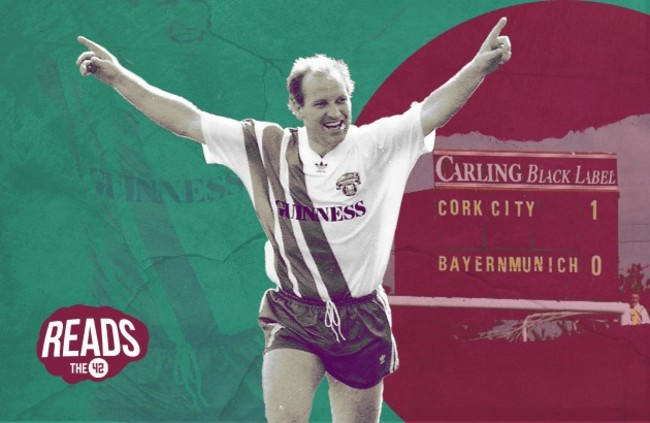
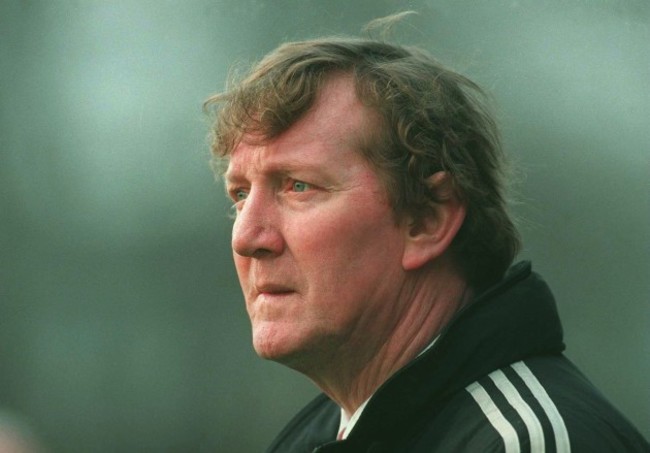
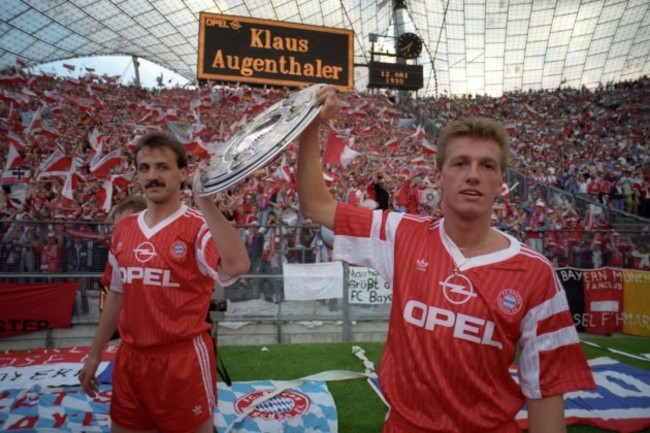
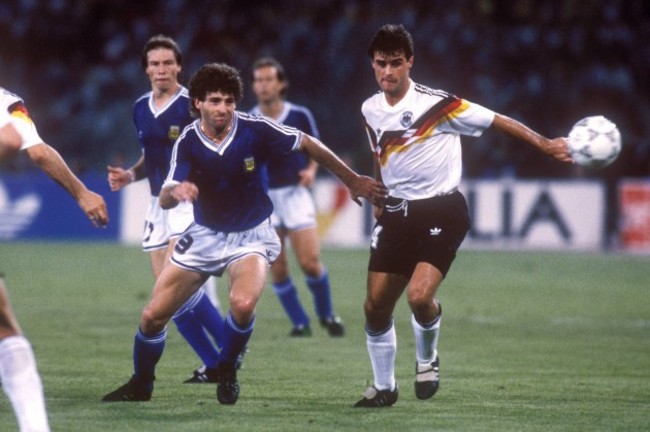
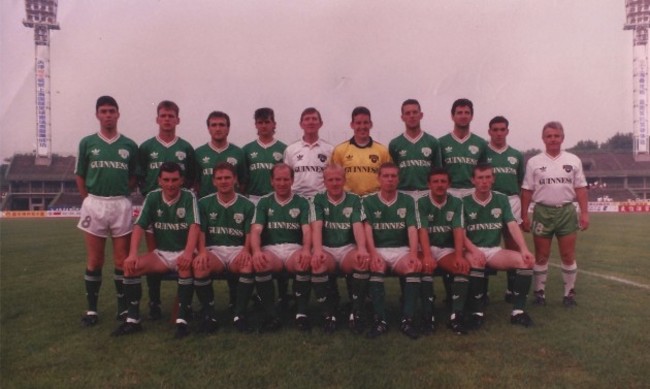
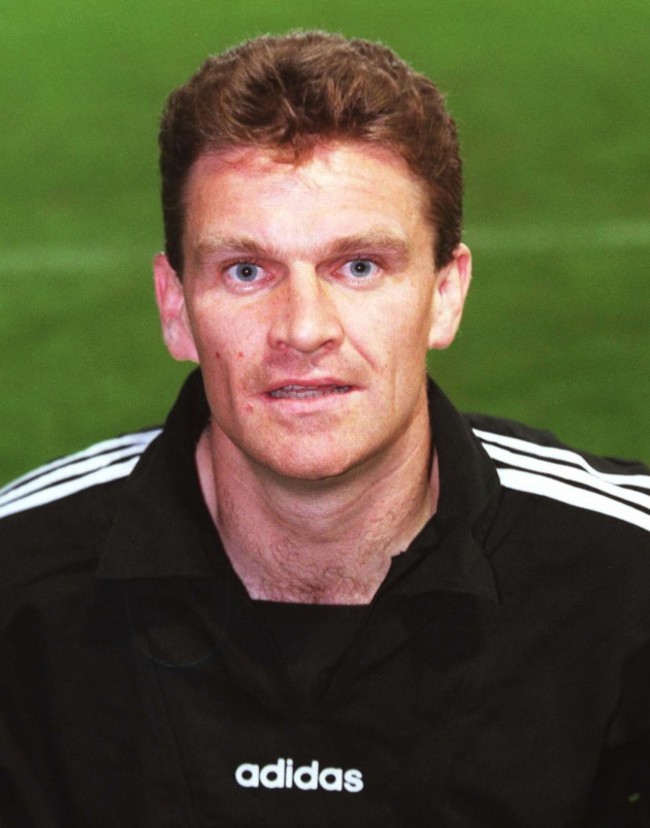
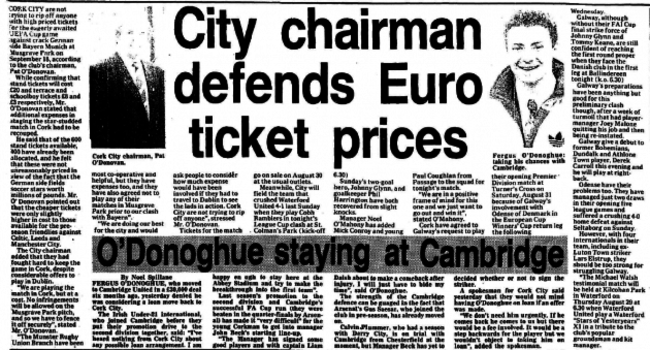
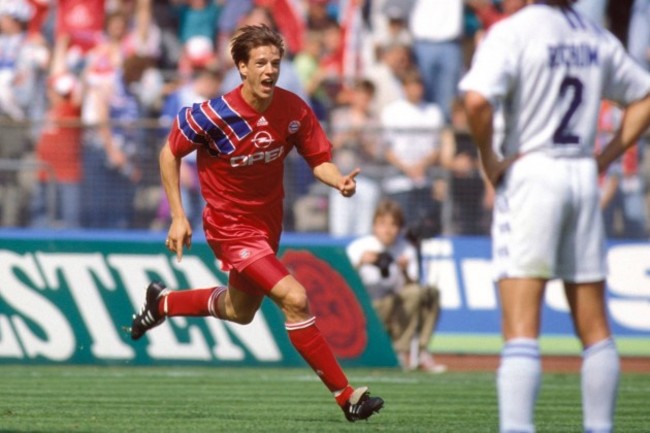
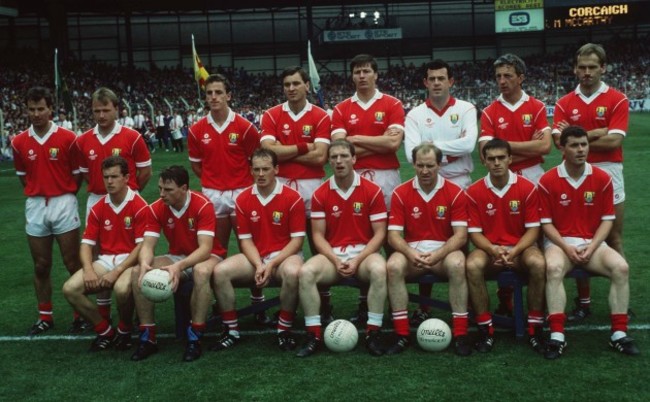
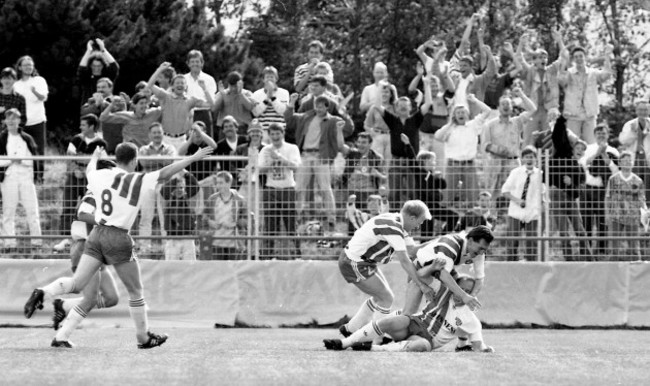
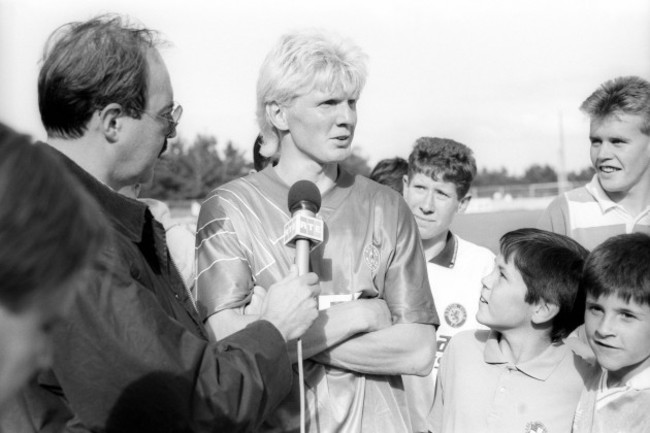
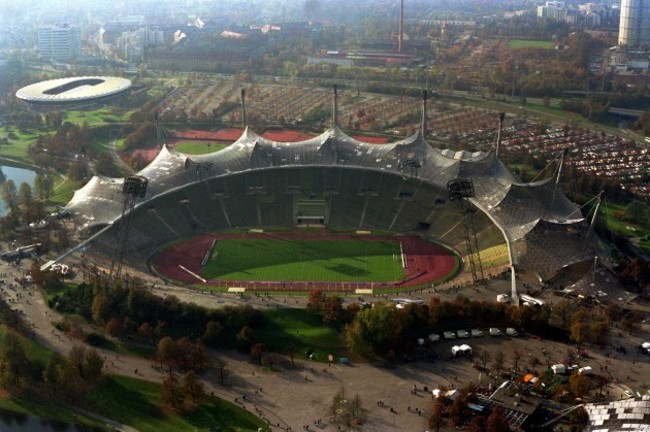
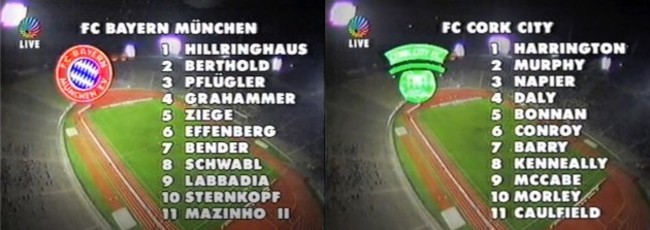
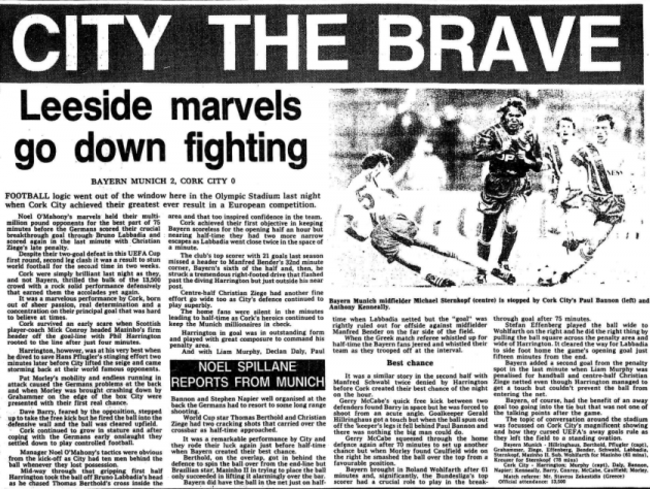
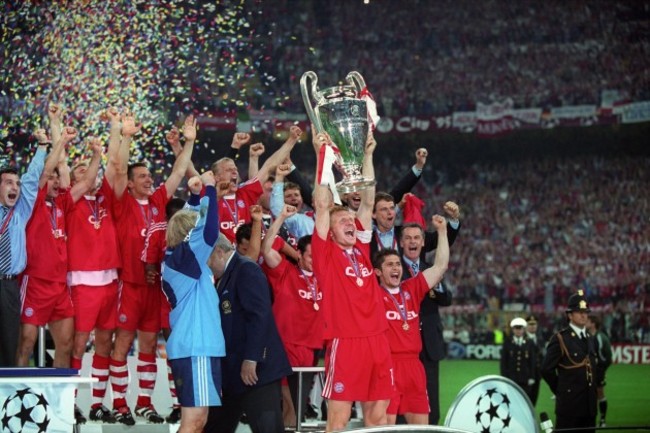
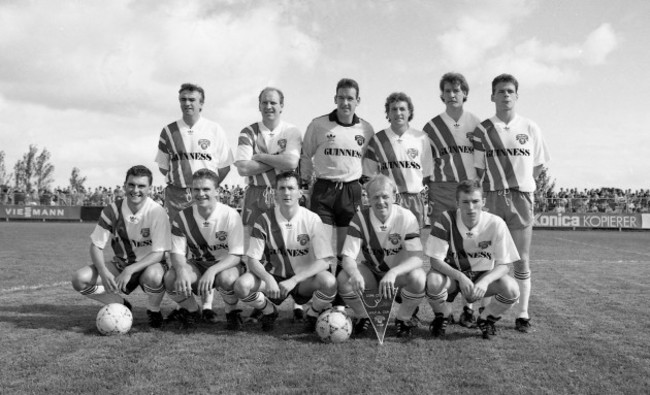
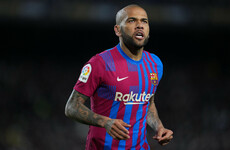
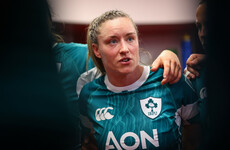

You had no available strikers and you didn’t go with a False 9? Your status as football hipster is now revoked. Please hand back your copy of “Inverting the Pyramid”.
Into my 3rd season with Southampton…..
2 7th places finishes a cup final and I. Europe…….
Not too bad
Get in Daniel Carr from Huddersfield – Frightening quality and cheap
You’d want to get a wriggle on if you’re going to win the Champions League before Dec 1. If it’s taken this long to get to February in the game you’re either going to have to go all out (take a week off work/family) or concede defeat.
Why don’t we all help Paul with any tips on good affordable signings that he could make to improve his chances. It’s often a case of stumbling across cheap quality signings and sharing the find with friends.
Played 01/02 religously! (Anyone remember Javier Saviola??), i actually cannot play a version from 09 on, seasons take too long and everything became far too complicated. Im playing 08 the last few years, seems to be the last uncomplicated version. Maybe i just cant except change?? Lol.
Saviola was a goal machine!!
How long does a season take in the games these days? I’m a recovering cm01/02 player (kinda like being an alcoholic, although I may not have played today, I know just one match and I’m back to where I started) – was gona buy this but someone said the seasons take ages these days.
Mid-table mediocrity in the Argentine second division is where it’s at.
Try winning it with Limerick FC – took me ten in game years to win! Once you get qualified for the CL you get some good money to invest in players!
Loved the game years ago but had to stop due to losing too many weekends !
Illegally downloading it as we speak, i know miles jacobson wont be happy but i invested all my gaming money on Gta V. Might take on the brighton challenge too, sorry miles i bought every version up until now ;)
Its not illegal at all. The game is so old eidos released it for free. Go to champman0102.co.UK and you can download the game and update the database to the the 2013 season. Has to be the most addictive game ever created
What about Cork?
Da people’s republic is only available as an international side in the newer versions – wouldn’t be able to compete for the champo league with them.
I once won the champions league with dubnica nad chain who were in the Slovak 2nd division when I started with them :)
*dubnica nad vahom…curse you autocorrect!
Curse you indeed!
Nerds
Quaaaaaaaaare
…..says the “Back to The Future Trilogy” fan!!
cm 01/02 won’t work on windows 7 :-(
I tried to play the newer versions but it’s just not the same. Definitely stuck in my ways..
It’s a free download from a message board site, Google champman01/02. there is a way of installing on 7 and it’s on the website. Looks daunting at first but easy to do
It will work on windows 7 fine. After install right click the exe file and in properties change to compatibility mode as windows 98 and set as always run as administrator and it will work perfectly
How does one download it illegally?… Don’t worry I pay all my taxes
When is FM2014 out on android????…just checked play store…no sign of it?
Well at least you’re using FMC so the seasons shouldn’t take too long to do!
I started league 2 with bury won 3 consecutive promotions in the premier league now mid table.